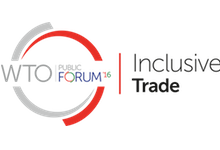Enabling human rights and inclusiveness through digital trade
27 Sep 2016 13:00h - 14:30h
Event report
[Read more session reports and live updates from the 2016 WTO Public Forum]
This session, organised by Computer and Communications Industry Association and DIGITALEUROPE, focused on the interconnections between trade and digital rights, and explored how the WTO and trade rules can address online censorship and better enable human rights and inclusiveness.
The session’s moderator, Christian Borggreen, Director of the Computer & Communications Association, introduced the discussion by outlining the enormous economic and social potential of the Internet, as well as its challenges. These challenges are both in the economic (e.g. outdated trade rules and digital protectionism) and in the political (e.g. censorship, filtering, and blocking) realm.
Colombian Ambassador and Permanent Representative to the WTO Juan Carlos Gonzalez provided an overview of how Colombia is attempting to capture the benefits of the Internet in four pillars: 1) infrastructure, 2) users, 3) services, and 4) applications.
While technology can have multiple benefits, many of the panellists also talked about how to prevent it from being misused. Julia Jasinska, Head of Trade Policy at Nokia, gave her perspective on how a private sector company works towards the intersection of human rights and technology. She explained that, internally, Nokia has a Human Rights Policy, while across the industry, the company has cofounded a Telecom Industry Dialogue.
Arzu Geybulla, a columnist and journalist active in Turkey, contributed to the panel with a video message. She explained that the Internet has brought many opportunities for reporting, in particular citizen journalism. Yet the increased crackdown on access to Internet content in Turkey imposes serious limits on her work as a journalist. Geybulla’s testimony closely related to the work of Jodie Ginsberg, CEO of the Index on Censorship. Ginsberg embedded the example of Turkey into a global trend of censorship in multiple dimensions: mass blocking, takedown of specific content, licences to force companies to remove content, and moves against encryption. She explained that infringements on human rights have huge implications for trade.
The connection between human rights protection and trade was further emphasised by Silvia Grundmann, Head of Media and Internet Division of the Council of Europe. She argued that there is a direct line between good human rights protection and better trade, seeing human rights as an enabler for inclusiveness. She explained how access to connectivity is particularly important for small and medium enterprises. She presented a recent report by the Council of Europe and the Swiss Institute of Comparative Law on filtering, blocking, and take-down of illegal content on the Internet, which analyses the national legal framework of its 47 member states related to such practices.
Marietje Schaake, Member of the European Parliament representing the Netherlands, shared a video message in which she argued that, despite the link between trade and human rights, trade agreements can play a role but they cannot change fundamental law. There should be a more coordinated approach between actors to optimise the interplay between economic opportunities and digital rights. Trade agreements are not a zero-sum consideration between economic benefits and digital rights, but rather strengthen each other.
The final speaker of the panel, Hosuk Lee-Makiyama, Director of the European Centre for International Political Economy, reminded everyone that the WTO members and rules ‘are quite indifferent to human rights standards’. The only condition is that countries should adopt the least trade-restrictive measures. He noted that in some cases, online censorship practices have been abandoned due to their trade-restricting effects. He also urged the audience to be patient when observing countries’ transitions into more equitable societies, saying that this is not a quick procedure, but will rather take multiple generations. Trade agreements can help lead to more openness and exchange, but , alone, they are not the ultimate answer in bringing about changes towards more inclusive societies.
The subsequent Q&A addressed many aspects of the debate, including taxation, privacy, and domestic regulations. According to Ginsberg, ‘we can have all trade agreements we want, but if governments don’t introduce legislation, trade agreements mean absolutely nothing.’
To conclude, the session highlighted that respect for human rights, in particular Internet access, freedom of expression, and privacy, has significant potential to improve inclusiveness and trade. Yet, following the line in the other direction, international trade agreements themselves may play a limited role in pursuing online freedoms. Although such agreements can contribute to human rights and inclusiveness, they are part of a broader and longer process, and are largely dependent on a number of conditions, including countries’ domestic regulations.
by Barbara Rosen Jacobson
Related topics
Related event

